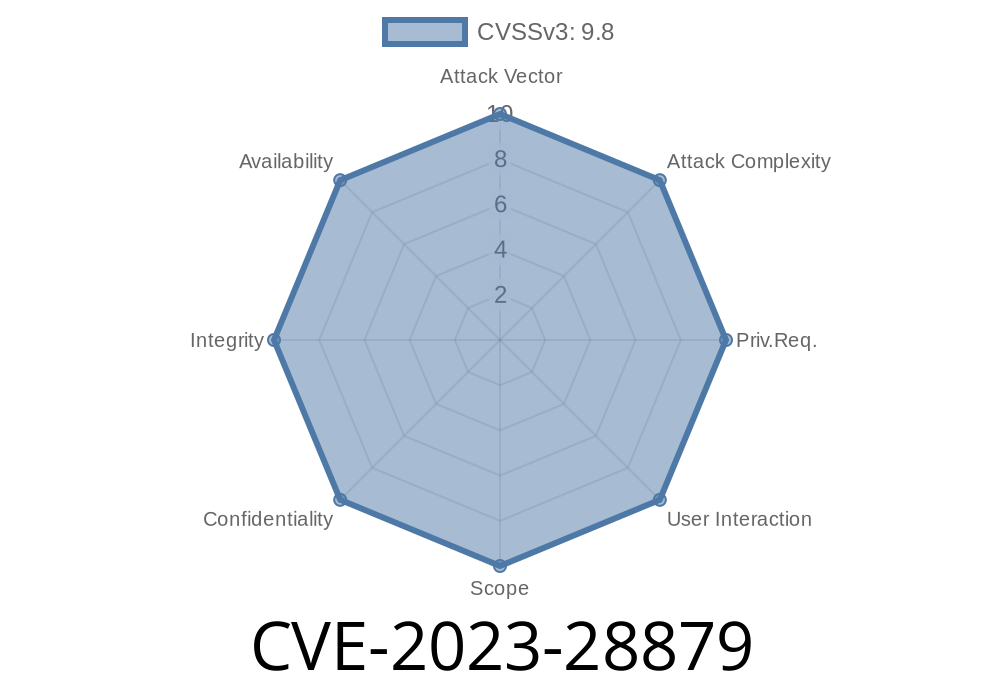Artifex Ghostscript has long been a trusted name for PostScript and PDF processing. But even these stalwarts can have bugs, and CVE-2023-28879 is a recent example. This post is an exclusive, plain-English deep dive into the vulnerability: what happened, where, why, how it can be abused, and what you can do about it—including a code snippet for your own testing.
What is CVE-2023-28879?
In Ghostscript (all versions through 10.01.), there’s a buffer overflow in the file base/sbcp.c. This bug sits in the routines for encoding and decoding Binary Communications Protocol (BCP):
TBCPDecode.
The core of the problem?
If the write buffer is filled to just one byte less than its maximum, and you trigger an ‘escaped’ character, the code tries to write two bytes—spilling past the intended buffer.
This can corrupt data inside the PostScript interpreter, possibly leading to code execution or denial-of-service.
Where Does the Flaw Happen?
The bug lives in code handling escaped bytes. Here’s a simplified, illustrative snippet (for clarity):
// Simplified example of buggy behavior in sbcp.c
if (buffer_used == buffer_size - 1) { // Only 1 byte room left
buffer[buffer_used++] = '\\'; // Writes the backslash '\'
buffer[buffer_used++] = c; // Writes escaped character
// Now 'buffer_used' points PAST end of buffer!
}
If only one byte is remaining, but you write two bytes = OOPS.
In the real code, this happens during special PostScript “escaped” character processing, e.g., at the end of a line or if the character needs to be quoted.
How Can Attackers Abuse It?
The buffer overflow itself means arbitrary memory corruption. In practice, a crafted PostScript (PS) or PDF file could cause:
Potentially executing further crafted code, depending on environment and mitigations
No public exploit code was released at first, but constructing a Proof-of-Concept is straightforward. Here’s how you’d trigger it:
1. Submit a PS/PDF file that forces the buffer right to the edge (buffer full minus 1).
Below is a minimal C illustration (not real Ghostscript code, but very close to the logic)
#include <stdio.h>
#include <string.h>
#define BUFFER_SIZE 10
int main() {
char buf[BUFFER_SIZE] = {};
int used = BUFFER_SIZE - 1; // Only 1 byte left
buf[used++] = '\\'; // Intended escape
buf[used++] = 'n'; // Actual character (overflow here!)
printf("Buffer contents: %s\n", buf);
// Will likely print garbage or crash depending on stack layout
return ;
}
Feed this logic with real Ghostscript or fuzz the relevant PostScript streams, and you’ll see crashes or strange behavior. In the real attack, you’d craft a PostScript file that pushes the buffer to just the right limit.
Patching and Mitigation
Artifex quickly patched this issue in Ghostscript 10.01.1+
- Patch details: Ghostscript Commit
Their fix involves checking the buffer has at least two bytes left before writing an escape sequence!
if (buffer_used <= buffer_size - 2) {
buffer[buffer_used++] = '\\';
buffer[buffer_used++] = c;
} else {
// Handle lack of space properly!
}
If you use Ghostscript:
Upgrade to 10.01.1 or later immediately
- Isolate/untrusted files, especially on shared or internet-facing systems
References
- CVE-2023-28879 on MITRE
- Full Ghostscript Vulnerability Advisory
- Artifex Security Advisories
Summary
CVE-2023-28879 is a classic buffer overflow, but inside a critical PDF/PostScript engine used industry-wide. The bug itself is simple—a missing check that two bytes fit into an almost-full buffer. The impact is serious: denial-of-service or even memory corruption and code execution. If you manage PDF workflows, servers, or printers that use Ghostscript, update now, and keep user files in tightly sandboxed environments.
Stay secure!
*– The AI Security Digest*
Timeline
Published on: 03/31/2023 17:15:00 UTC
Last modified on: 04/15/2023 04:16:00 UTC
